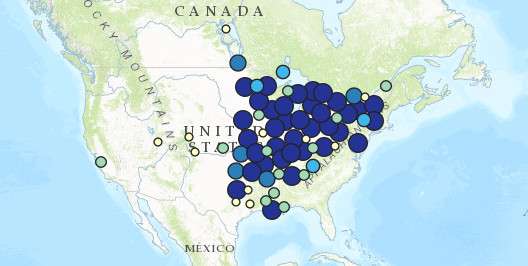
NEW MILFORD, Conn. — Candlewood Lake, arguably Connecticut’s most popular bass fishery, is but one of many waterways newly threatened by zebra mussels as the exotic species continues its expansion across the United States and into Canada.
“They’re not in Candlewood yet, but they’re right on our doorstep,” said Len Greene of FirstLight Power Resources, which owns and operates the Rocky River power station on the fishery.
The mussels recently were found on the foundation of the station, which generates electricity by pumping water between the lake and the river.
“We’ve been able to buy five years with the pumping restrictions,” Greene added. “It’s an unfortunate situation that I think was inevitable at some point, given that zebra mussels spread everywhere they can.”
Sadly, much of that spreading these days occurs by hitchhiking on boats and trailers. That’s why many states now encourage, and sometimes even mandate, that boaters “clean, drain and dry” before moving their vessels from one water body to another. Also, vehicle inspection stations at state borders along interstate highways are becoming commonplace, especially west of the Rockies.
Originally from eastern Europe and western Asia, the shellfish were first found in Lake St. Clair near Detroit in 1988. Scientists believe that they arrived in ballast water of ships and also spread throughout the Great Lakes that way. They exited the lakes via rivers, especially the Illinois and Mississippi, their larval veligers washed downstream by current. From there, they’ve migrated up to Minnesota and down to Louisiana, as well as east in the Ohio River and west on the Arkansas.
So far, few have been found in the Missouri River, but resource managers in the Northwest recently were dismayed to learn of their discovery in Montana’s Tiber Reservoir on the Marias River, a tributary of the Missouri.
“It’s like the nightmare you never wanted to have,” said Montana state Rep. Mike Cuffe.
He added that if federal money had been there to help Idaho, Montana, Oregon and Washington double the work being done at checkpoints, “the originator of these mussels might have been picked up before they were in the water.”
Manitoba, Saskatchewan and Alberta also are on high alert. Thus far, the invaders have been confirmed only in Manitoba’s massive Lake Winnipeg.
Additionally, Oklahoma recently confirmed that mussels have been found in Lake Hefner, a water supply reservoir in northwestern Oklahoma City. Thus far, about 20 fisheries in that state have been infested, along with several in Texas.
“Zebras are a serious threat,” said Curtis Tackett, aquatic nuisance specialist for the Department of Wildlife Conservation.
Much of that threat stems from the fact that the prolific shellfish form dense colonies that block water intakes and discharges, forcing billions of dollars to be spent annually on control measures. Additionally, they compete with native species, both fish and invertebrates, for food and habitat.
Also, zebra mussels continue to spread across inland waters in the North. Resource managers recently revealed that they have been found in Minnesota’s Franklin Lake in the western part of the state and Wisconsin’s Big McKenzie Lake in the northwest.
“This new confirmation is another reminder of the importance of carefully examining all equipment when taking it out of the water,” said Heidi Wolf of the Minnesota Department of Natural Resources.





